Customs (Phong tục)
1. a. Choose the correct options.
(Chọn những lựa chọn đúng.)
1. In Asian countries, it is important to respect/bow the elderly.
2. The British often shake/cross hands for greeting when they meet someone.
3. Don’t cross your hips/arms. It can show that your are unpleasant or angry.
4. In our country, we bow/shake our heads to show respects to other people.
5. When you visit someone, you should respect/offer fruit or food to the host.
6. In some countries, it is impolite to stand with your hands on your hips/heads.
|
1. respect |
2. shake |
3. arms |
|
4. bow |
5. offer |
6. hips |
1. In Asian countries, it is important to respect the elderly.
(Ở các nước châu Á, việc tôn trọng người già là điều quan trọng.)
Giải thích: respect (v): tôn trọng; bow (v): cúi chào
2. The British often shake hands for greeting when they meet someone.
(Người Anh thường bắt tay chào hỏi khi gặp ai đó.)
Giải thích: shake hands: bắt tay; cross hands: bắt chéo tay
3. Don’t cross your arms. It can show that your are unpleasant or angry.
(Đừng khoanh tay. Nó có thể cho thấy rằng bạn đang khó chịu hoặc tức giận.)
Giải thích: hip (n): eo; arm (n): cánh tay
4. In our country, we bow our heads to show respects to other people.
(Ở nước ta, chúng ta cúi đầu để thể hiện sự tôn trọng với người khác.)
Giải thích: bow head: cúi đầu chào
5. When you visit someone, you should offer fruit or food to the host.
(Khi đến thăm ai đó, bạn nên mang hoa quả hoặc đồ ăn cho chủ nhà.)
Giải thích: offer (v): dâng tặng
6. In some countries, it is impolite to stand with your hands on your hips.
(Ở một số nước, việc đứng chống tay lên hông là bất lịch sự.)

Các bài tập cùng chuyên đề
a. Match the underlined words with the definitions. Listen and repeat.
(Phù hợp các từ được gạch chân với các định nghĩa. Nghe và lặp lại.)
|
1. My family is a nuclear family. I live with my parents and sisters. (Gia đình tôi là gia đình hạt nhân. Tôi sống với bố mẹ và các chị gái.) |
a. the relationship between two people married to each other (mối quan hệ giữa hai người kết hôn với nhau) |
|
2. Tết is the only time I see all my relatives. My aunts and uncles don't live near us. (Tết là dịp duy nhất tôi được gặp tất cả người thân của mình. Các cô chú của tôi không sống gần chúng tôi.) |
b. a family including only parents and children (một gia đình chỉ có cha mẹ và con cái) |
|
3. Many young women prefer to be single. They don't want to get married. (Nhiều phụ nữ trẻ thích sống độc thân. Họ không muốn kết hôn.) |
c. a family including parents, children, aunts, uncles, grandparents, etc. (một gia đình bao gồm cha mẹ, con cái, cô, chú, ông bà, v.v.) |
|
4. My friend lives with her extended family. She lives with her parents, grandparents, aunts, and uncles. (Bạn tôi sống với đại gia đình của cô ấy. Cô sống với bố mẹ, ông bà, cô dì chú bác.) |
d. all the people of about the same age in a family or a society (tất cả những người cùng độ tuổi trong một gia đình hoặc một xã hội) |
|
5. Many men don't like being a house husband. They think men should earn money for the family. (Nhiều người đàn ông không thích làm chồng ở nhà. Họ cho rằng đàn ông nên kiếm tiền nuôi gia đình.) |
e. a member of your family (Một thành viên của gia đình bạn) |
|
6. My grandpa says my generation doesn't work hard, and people my age just want easy jobs. (Ông tôi nói rằng thế hệ của tôi không làm việc chăm chỉ và những người ở độ tuổi của tôi chỉ muốn những công việc dễ dàng.) |
f. the person in a family earning money to support the family (người trong gia đình kiếm tiền để nuôi sống gia đình) |
|
7. She became the breadwinner and worked to take care of her family. (Cô trở thành trụ cột và làm việc để chăm sóc gia đình.) |
g. end the relationship between a husband and a wife by an official process (chấm dứt quan hệ vợ chồng bằng thủ tục chính thức) |
|
8. My cousin is in a happy marriage with his wife. (Anh họ tôi đang có một cuộc hôn nhân hạnh phúc với vợ anh ấy.) |
h. not married or not in a relationship with someone (chưa kết hôn hoặc không có mối quan hệ với ai đó) |
|
9. My uncle is getting divorced. His wife doesn't want to be with him anymore. (Chú tôi sắp ly hôn. Vợ anh không muốn ở bên anh nữa.) |
i. a married woman staying at home and doing housework (một người phụ nữ đã có gia đình ở nhà và làm việc nhà) |
|
10. My grandma was a housewife. She took care of the family and didn't have a job after getting married. (Bà tôi là một bà nội trợ. Cô ấy phải chăm sóc gia đình và không có việc làm sau khi kết hôn.) |
j. a married man staying at home and doing housework (một người đàn ông đã có vợ ở nhà và làm việc nhà) |
a. Read the words and definitions, then match the words with the pictures. Listen and repeat.
(Đọc các từ và định nghĩa, sau đó nối các từ với hình ảnh. Lắng nghe và lặp lại.)
bake: cook food in an oven without extra oil or water
(Nướng: Nấu thức ăn trong lò mà không cần thêm dầu hoặc nước)
sketch: make a quick drawing of something or somebody
(Vẽ phác: Vẽ nhanh về một cái gì đó hoặc một người nào đó)
tuk-tuk: a vehicle with three wheels, with open sides and no doors
(Xe ba gác: Một phương tiện có ba bánh, với các bên mở và không có cửa)
nephew: the son of your brother or sister
(Cháu trai: Con trai của anh hoặc chị em của bạn)
clay pot: a deep bowl used for cooking, made from heavy, sticky soil from the ground
(Nồi đất sét: Một bát sâu được sử dụng để nấu ăn, được làm từ đất sét nặng, dính từ mặt đất)
stall: a table or small shop with an open front for people to sell things from
(Quầy: Một cái bàn hoặc cửa hàng nhỏ với mặt trước mở để người ta bán hàng từ đó)
niece: the daughter of your brother or sister
(Cháu gái: Con gái của anh hoặc chị em của bạn)
cottage: a small house, often found in the country
(Lều: Một ngôi nhà nhỏ, thường được tìm thấy ở nông thôn)
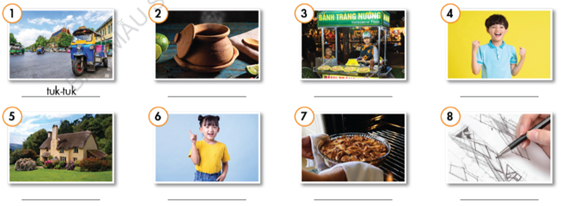
b. Match the sentences (1-6) in Exercise 1a with the pictures (A-F).
(Nối các câu (1-6) trong Bài tập 1a với các hình ảnh (A-F).)

1. Fill in each gap with the correct word from the list. Listen and check, then repeat.
(Điền vào mỗi chỗ trống với từ đúng trong danh sách. Nghe và kiểm tra, sau đó lặp lại.)
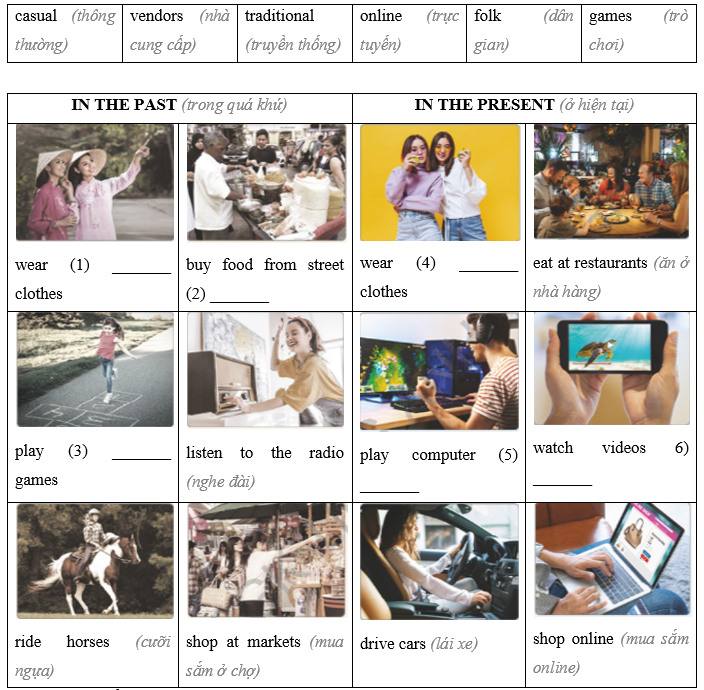
5. Listen and repeat. Fill in each gap with the correct phrase from the list.
(Nghe và lặp lại. Điền vào mỗi chỗ trống với cụm từ đúng trong danh sách.)
|
extended family (đại gia đình) |
nuclear family (gia đình hạt nhân) |
do the housework (làm việc nhà) |
|
raise children (nuôi con) |
make a living (kiếm sống) |
support the family (nuôi sống gia đình) |
1. My parents’ salary is good enough to _______.
2. In my _______, there is my mum, dad, sister and me.
3. My _______ includes my parents, grandparents, aunt, uncle, cousins and me.
4. Women in the old days stayed home to _______ and teach them how to behave well.
5. A long time ago, only men used to _______ by working outside the home.
6. Today, all family members _______ to keep the house clean.
2 3.01 Study the Vocabulary box. Match the words with the photos (A-H). Listen and check.
(Nghiên cứu hộp Từ vựng. Nối các từ với các bức ảnh (A-H). Nghe và kiểm tra.)
|
Vocabulary Aspects of our nation (Từ vựng) (Các khía cạnh của đất nước chúng ta) |
|
economic growth increased infrastructure love for nature improved living conditions advanced technology traditional cuisine national identity family values |
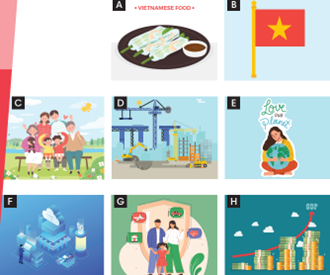
Tạm dịch:
economic growth: tăng trưởng kinh tế
increased infrastructure: cơ sở hạ tầng tăng cường
love for nature: tình yêu dành cho thiên nhiên
improved living conditions: điều kiện sống được cải thiện
advanced technology: công nghệ tiên tiến
traditional cuisine: ẩm thực truyền thống
national identity: bản sắc dân tộc
family values: những giá trị gia đình
1 Use the glossary to find:
(Sử dụng từ điển để tìm:)
1 a tall building: ...
(một tòa nhà cao tầng)
2 an adjective that means ‘very special’: ...
(một tính từ có nghĩa là 'rất đặc biệt')
3 a phrase that shows differences:...
(một cụm từ cho thấy sự khác biệt)
4 people who watch something: ...
(những người xem thứ gì đó)
5 an adjective that means very simple: ...
(một tính từ có nghĩa là rất đơn giản)
2 Complete the Word Friends below.
(Hoàn thành Word Friends bên dưới.)
1 advanced .
2 growth
3 condition
4 increased .
5 national .
6 cuisine
Customs (Phong tục)
1. Fill in each gap with cross, shake, stand, offer, bow or respect.
(Điền vào từng khoảng trống với cross, shake, stand, offer, bow, hoặc respect.)
Vietnamese Customs
You have to mind your manners when you are abroad. In Việt Nam, for example, it is unusual to kiss on the cheek to say hello. We usually 1) _________ hands or 2) _________ our heads slightly with a smile. If someone invites you to dinner, you should 3) _________ fruit to the host. Don't start eating before the oldest person. This shows that you 4) __________ the elderly. When you are having a conversation, don't 5) ________ your arms or 6) __________ with your hands on your hips; it's impolite in Việt Nam.
2. Read the sentences. Fill in each gap with the correct word, then find the words in the puzzle.
(Đọc các câu. Điền từ đúng vào mỗi chỗ trống, sau đó tìm các từ trong câu đố.)
1. Nowadays, people wear c_______ clothes like T-shirts and jeans.
2. Today, a lot of teens enjoy playing computer g_______.
3. In the past, many people could ride h_____.
4. Do you often shop o______ or go to the shops?
5. People usually bought food from s_________ vendors in the past.
6. Do you like listening to the r__________ or watching TV online?
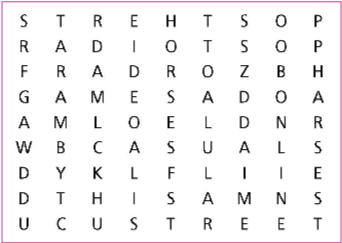
3. Fill in each gap with ONE suitable word from Exercise 1. Use the correct forms of some words.
(Điền vào mỗi chỗ trống MỘT từ thích hợp trong Bài tập 1. Sử dụng dạng đúng của một số từ.)
Hi everyone! Thanks for reading my blog. You can also watch the video online. I'm posting it on my new vlog. Last week, I visited my grandparents, and they told me about life in the past. They didn't 1) w_______
casual clothes like we do today. They wore 2) t_______ clothes. They didn't drive 3) c_______ either. Instead, they 4) r_______ horses or walked to get around their town. Also, there were no supermarkets or online shops, so they 5) s_________ at the markets. They didn't eat at 6) r_______ very often, either. They usually 7) b_________ food from street vendors instead. My grandpa 8) p_______ computer games with me sometimes, but he played folk games with his friends in the past. In fact, he taught me some of them during my visit. I'll show you how to play in my next vlog entry. Bye for now!
1. Write the correct phrase below under each picture.
(Viết cụm từ đúng sau đây dưới mỗi bức tranh.)
|
ext |
2. Complete the sentences with the words and phrase from the box.
(Hoàn thành câu với các từ và cụm từ trong khung.)
|
pursue – memorise – depended – take notes – replaced |
1. In the old days, transportation in my village _____ on buffalo-drawn carts.
2. Children now have various sources to _____ their interests.
3. Most families in my village have _____ their radios with TVs.
4. Did you _____ of the history lesson today?
5. Today, we don’t have to _____ too much information. We can access it on the Internet.
3. Choose the option which is CLOSEST in meaning to the underlined word / phrase in each sentence.
(Chọn phương án GẦN NHẤT về nghĩa với từ / cụm từ được gạch chân trong mỗi câu.)
1. My grandmother spent her childhood in various parts of Viet Nam.
A. similar
B. different
C. difficult
D. same
2. I took notes in my notebook of the talk on the history of the drums.
A. liked
B. learned
C. understood
D. wrote down
3. Children now have fewer opportunities to learn about nature than their peers in the past.
A. chances
B. time
C. interests
D. tools
4. Students now do not depend as much on textbooks as they used to.
A. want
B. rely wholly
C. appreciate
D. ask for
5. People now can entertain from various sources like TVs, computers, smartphones, entertainment centres.
A. rare
B. few
C. interesting
D. many
4. Choose the correct option A, B, C, or D to complete each sentence.
(Chọn phương án đúng A, B, C hoặc D để hoàn thành mỗi câu.)
1. My grandparents don’t believe in a(n) _____ parent-child relationship.
A. extended
B. democratic
C. personal
D. interesting
2. Children nowadays have more freedom to _____ their interests.
A. pay for
B. replace
C. know
D. pursue
3. I love living in a(n) _____ family where I can learn about traditional values from my grandparents.
A. extended
B. nuclear
C. large
D. democratic
4. Families used to live in one-room houses and they had little _____.
A. time
B. understanding
C. privacy
D. opportunity
5. Older people prefer reading the news from newspapers while the younger get news from the Internet. That’s an example of _____.
A. a conflict
B. an attitude
C. mass communication
D. a generation gap
b. Fill in the blanks using the words from Task a.
(Điền vào chỗ trống bằng cách sử dụng các từ trong Bài tập a.)
1. My brother's son is a very polite boy. I'm proud to have a nephew like that.
(Con trai của anh trai tôi là một cậu bé rất lễ phép. Tôi tự hào khi có một đứa cháu như thế.)
2. My sister just had a baby girl. I'm so happy. Now, I have a .
3. In some countries, people cook food in a on a fire.
4. If you visit Thailand, the taxis are often s, not cars or motorbikes.
5. The fruit at the market sells really fresh pineapples.
6. On my birthday, my mom always s me a cake. She never buys one from a store.
7. My grandparents live in a little in the country. It's only has four rooms.
8. I love to pictures when I visit my grandparents in the country side.
1. Match the verbs below with the definitions.
(Ghép các động từ bên dưới với định nghĩa.)

1. breathe in suddenly and loudly because you're surprised or in pain: ________
2. produce liquid on the surface of your skin because you're hot or nervous: _______
3. when part, or all, of your body moves quickly because you're afraid or cold: _______
4. make a loud, high noise because you're afraid or hurt: _______
5. open your mouth wide and breathe in because you're tired or bored: _______
1. Look at the pictures. Write the missing letters.
(Nhìn vào các bức tranh. Viết các chữ cái còn thiếu.)
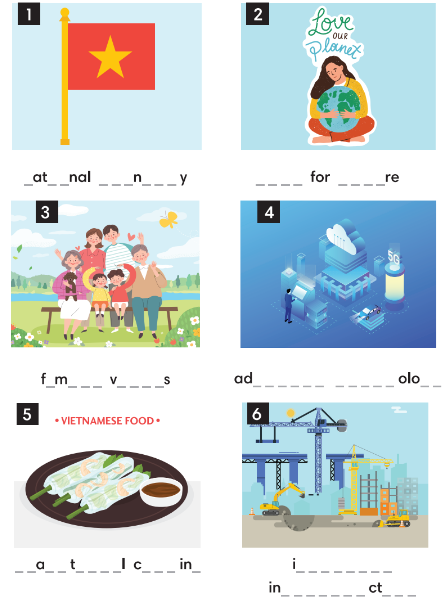
2. Match the phrases on the left with their definitions on the right.
(Nối các cụm từ bên trái với định nghĩa của chúng ở bên phải.)
|
1. ☐ Love for nature |
a. positive changes in the quality of life |
|
2. ☐ Traditional cuisine |
b. expansion of production and consumption |
|
3. ☐ Family values |
c. shared values and characteristics of a nation’s people. |
|
4. ☐ Economic growth |
d. affection and appreciation for the natural world |
|
5. ☐ Improved living conditions |
e. food traditions passed down through generations |
3. Fill in the blanks with the appropriate words or phrases below.
(Điền từ hoặc cụm từ thích hợp vào chỗ trống bên dưới.)
|
advanced technology |
increased infrastructure |
traditional cuisine |
|
economic growth |
national identity |
family values |
|
improved living conditions |
love for nature |
1. The _______ of a country leads to more job opportunities for citizens.
2. _______ include better access to healthcare, education, and basic facilities.
3. _______ means that better quality can be seen in transportation, communication, and healthcare systems.
4. _______ such as Al, the Internet, or biotechnology contributes to the overall development of a society.
5. I think you will not lose your _______ if you speak the language, eat the food and communicate with native people.
6. _______ are very important in shaping individuals' characters when they are young.
7. Wherever I go, I will always want to try the country's _______.
8. She spent hours hiking in the mountain. Her _______ was very clear and strong.
1. What forms of traditional entertainment do these pictures show? Fill in the blank with the forms of entertainment below.
(Những hình ảnh này cho thấy những hình thức giải trí truyền thống nào? Điền vào chỗ trống với các hình thức giải trí dưới đây.)
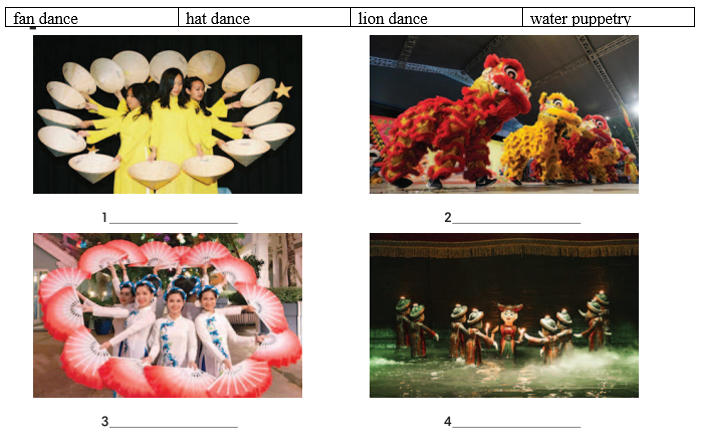
2. Complete the sentences with the words / phrases given below.
(Hoàn thành các câu bằng các từ/cụm từ cho sẵn bên dưới.)
|
fortune |
entertaining |
historical legends |
pay homage to |
1. In water puppetry, people control the puppets under the water, telling stories, usually about _______ of Việt Nam.
2. In lion dance, people dress up as lions and dance around. It's really _______ to watch.
3. Traditional dances bring joy and _______ to the audience.
4. Through traditional dances, we _______ our traditions and ancestors.
2. Choose the correct answer.
(Chọn câu trả lời đúng.)
1. _______ is a unique performance where wooden puppets appear to move on the water.
a. Hat dance
b. Lion dance
c. Water puppetry
2. The _______ is said to bring good fortune during Tết celebrations thanks to the animal's power.
a. lion dance
b. water puppet
c. fan dance
3. The conical hats used in the hat dance _______ the traditional dress and agriculture of Việt Nam.
a. pay attention to
b. pay homage to
c. pay a visit to
4. Water puppet performances often tell stories about Vietnamese _______ legends.
a. history
b. historical
c. historically
5. Dancers in the lively _______ attract the audience with their beautiful movements and skillful use of fans.
a. lion dance
b. hat dance
c.fan dance
5. Match the words below with photos 1-5.
(Ghép các từ bên dưới với các bức ảnh từ 1-5.)
|
flag |
national symbol |
parade |
|
public holiday |
traditional-costume |
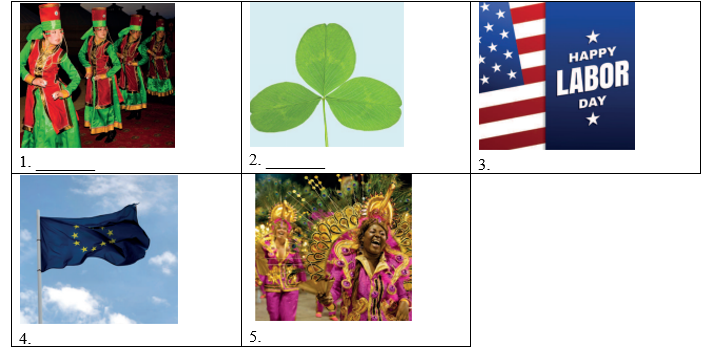
Choose the word CLOSEST in meaning to the underlined word.
The áo dài is the traditional dress of Vietnamese women.
-
A.
unfamiliar
-
B.
race
-
C.
customary
-
D.
occasional
Give the correct form of the word in brackets to complete the following sentences.
Give the correct form of the word in brackets to complete the following sentences.
Give the correct form of the word in brackets to complete the following sentences.
Give the correct form of the word in brackets to complete the following sentences.
Give the correct form of the word in brackets to complete the following sentences.

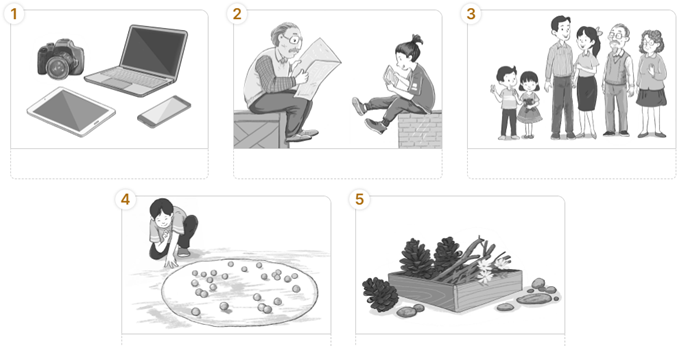 ended family – natural materials – electronic devices – traditional game – generation gap
ended family – natural materials – electronic devices – traditional game – generation gap





Danh sách bình luận